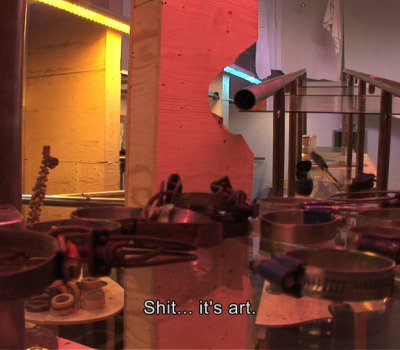Erik van Lieshout
dal 29/11/2011 al 28/1/2012
Segnalato da
29/11/2011
Erik van Lieshout
Bawag Contemporary, Wien
The exhibition centers around the film Commission from 2011, which will be presented in an installation setting that combines sculptural elements, drawings, and adhesive foils and oscillates between stage, catwalk, and shop. Commission is concerned with a utopia's failure in its various stages and questions the possibilities of social participation in an urban world comprised of excluded suburbs, privatized spaces, and malls kept under strict surveillance.

BAWAG Contemporary is pleased to be able to show new works by the Dutch artist Erik van Lieshout (born in Deurne, lives in Rotterdam). The exhibition centers around the film Commission from 2011, which will be presented in an installation setting that combines sculptural elements, drawings, and adhesive foils and oscillates between stage, catwalk, and shop.
Erik van Lieshout was commissioned to make a film about Zuidplein, a mall in the south of Rotterdam, in 2010. He had lived and worked in this neighborhood for fourteen years and made some films there, e.g. Respect, which was shown in the Dutch pavilion at the Venice Biennial of 2003, and Awakening (2005). After he had lived abroad for several years, Van Lieshout approached the commission responsible for a long-term art project in Zuidplein because he was looking for an opportunity to return to this working-class district that is home to several large immigrant communities.
Built in 1968 as one of the first in the Netherlands, the mall in Zuidplein once stood for a utopian vision, for future wealth and urban harmony. Yet, over the decades, the south of Rotterdam has sunk into severe poverty. The Zuidplein mall has turned into a hangout for the poor and unemployed – a place that is best avoided. At the same time, the city council’s policy has come to focus on representative buildings along the banks of the Maas River, which divides the city. Commissioning star architects like Renzo Piano, Norman Forster, Álvaro Siza, and Rotterdam-based Rem Koolhaas has transformed the south bank neighborhood into a showcase for contemporary architecture. Zuidplein, however, is too far in the south and neglected both politically and financially. The mall management has tried to revive a positive image for the center by assuring security with sixty-three surveillance cameras and making it obligatory for adolescents to keep walking.
In the summer of 2010, Erik van Lieshout opened a shop in an abandoned unit of the mall. Yet, instead of simply selling goods, he used his shop as a base from which to (re)connect with the neighborhood and its inhabitants, whom he involved in conversations characterized by the frank and often very funny vein typical of the artist and dealing with provenance, urban regeneration, security, and consumerism. Commission is Van Lieshout’s commentary on the sociopolitical powerlessness of man and art – and a quest for a home. Exploring the influence of people like Rem Koolhaas or the assassinated Dutch populist politician Pim Fortuyn, the film presents itself as the portrait of a place as well as an artist’s half-skeptical, half-hopeful attempt to become an agent of social good.
Commission is concerned with a utopia’s failure in its various stages and questions the possibilities of social participation in an urban world comprised of excluded suburbs, privatized spaces, and malls kept under strict surveillance. Zuidplein exemplifies how today’s social life is organized around the imperative of shopping and how the global branding policy of major consumer goods companies decides about the access to and the exclusion from these spaces while social life is merely pretended.
It is remarkable how the artist succeeds in delivering a revealing sociocritical analysis of the mall by playing some kind of puerile agent provocateur. He feigns naïve confusion and slips into the role of the innocent idealist in an incomprehensible and often hostile world. Shot in the style of a shaky home movie, Commission unfolds as a collage with quick cuts assembling documentary scenes and stop motion animations, in which interviews and shots of the mall alternate with cartoon-like drawings, views of models, and performative scenes.
The slogan Real luxury is to buy nothing mounted above the shop entrance defines the place as a showcase with many things to see, but nothing to buy. The slogan is a reference to and a quotation of Rem Koolhaas’s New York Prada store. Like Koolhaas in his flagship store, Van Lieshout’s Commission presents an exhibition in a consumer space which he tries to utilize culturally and turns looking at things into a luxury. His installation is aimed at creating a community and ensuring appreciation for the mall. In Zuidplein, however, there is no room for art or for showrooms with no things on sale. The artist just makes a lot of enemies, and, besides, people regard his slogan as cynical since they definitely have no money to buy something. Zuidplein remains a dazzling, gaudy and cheap place – a Junkspace as defined by Rem Koolhaas in 2001: “Junkspace is what remains after modernization has run its course, or, more precisely, what coagulates while modernization is in progress, its fallout.” Quite consistently, it is just junk that we find displayed in Van Lieshout’s shop.
The work has been commissioned by Sculpture International Rotterdam and Hart van Zuid as part of a long-term art project in Zuidplein, Rotterdam. Other artists involved in the project are, among others, Ken Lum and Ai Wei Wei.
(Christine Kintisch)
Image: Erik van Lieshout
Commission, 2011 HD Video, length: 48 Min. 47 Sec. Loop
Press preview November 30, 2011, 10:30 a.m.
Opening November 30, 2011, 7:00 p.m.
Bawag Contemporary
Franz Josefs Kai 3 - Wien
Daily 2:00 pm - 8:00 pm
Free Entry



